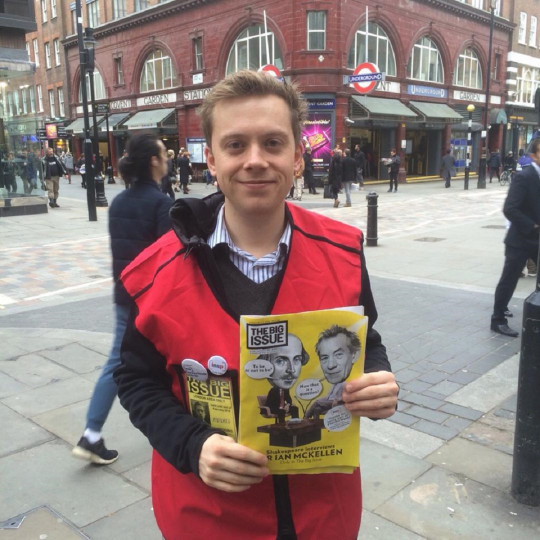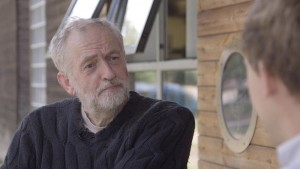
Owen Jones vendiendo ejemplares del semanario 'Big Issue' en Covent Garden, en febrero de 2016.
Instagram de Owen JonesEn CTXT podemos mantener nuestra radical independencia gracias a que las suscripciones suponen el 70% de los ingresos. No aceptamos “noticias” patrocinadas y apenas tenemos publicidad. Si puedes apoyarnos desde 3 euros mensuales, suscribete aquí
---------------------------------
CTXT ha acreditado a cuatro periodistas en los juicios Gürtel y Black. Y ha destinado a Miguel Ángel Ortega Lucas como corresponsal permanente en el Parlamento. ¿Nos ayudas a financiar este despliegue?
---------------------------------
Like many other people, Owen Jones (Sheffield, England, 1984) feels that 2016 has been “a really shit year”. While enjoying a drink at a hotel bar in the Portuguese capital, where he’s dropped in to take part in the WebSummit –the massive technology and start-up conference–, the young Guardian journalist and so-called “Podemos guru” rattles off the series of political disasters that have taken place over the past six months, a series of stunning electoral upsets that have resulted in surprise shifts around the world.
“First there was Brexit, of course”, he says with a sigh of frustration. “I saw it coming. I tried to visualize the people from the place where I grew up getting up that morning, getting dressed, going to the polls and voting to remain in the Union. I couldn’t do it”.
“Then there were the second elections in Spain, back in June. When the polls closed it looked like Podemos had won, but then it turned out that Rajoy had. The same thing happened with the peace treaty with the FARC in Colombia. And now Trump. 2016!”
The British journalist sits down with CTXT to discuss how things have evolved in the UK after the Brexit vote, where the number of assaults on foreigners and minorities has skyrocketed and a profoundly bigoted sector of the population feels that the referendum results have handed it the mandate to express its hate on the streets.
Nearly half a year after the Brexit vote, why do you think your fellow citizens chose to leave the European Union?
Brexit wasn’t really a vote about the E.U., because the E.U. is way down on people’s list of priorities in Britain. What is was about, firstly, was “taking back control”, a slogan which appealed to people who didn’t feel they had control over their own lives. Working class communities hammered by deindustrialization were the most likely to vote to leave the Union, overwhelmingly so. Above all else, though, it was about immigration. The problems of Britain are seen through that prism. The vote exposed fault lines in western society: young versus old, urban areas against small towns, university educated people versus working class people in small towns, nations –Scotland, Wales– versus the State.
What was the role of xenophobia and racism in the campaign?
The strategic decision of the Leave campaign was to base it on hate. They claimed that foreigners were potential rapists and murderers. They claimed Turkey would join the EU imminently and flood us with immigrants. Nigel Farage posed in front of a poster with dark-skinned refugees that said ‘Breaking Point’. Boris Johnson –our new Foreign Secretary– used Trump’s rhetoric and suggested that Obama was opposed to Brexit because he was a Kenyan who opposed old empire.
Stockport, the place where I grew up, has an immigrant population of 2%. Most are Irish, country with which we have a freedom of movement agreement. There are many social problems there, lack of jobs ripped from our economy by deindustrialization, lack of affordable homes due to a lack of a government policy that would favor their construction, stagnating living standards, public services under strain due to the unprecedented government cuts, the likes of which we haven’t seen in a generation.
The perverse element of the referendum is that the areas with the lowest immigration voted to leave; those with the highest voted to remain. London has a huge housing crisis, poverty wages… But they didn’t see it as a matter of immigration, even though 40% of the city is foreign born.
Is the British Left partially responsable for Brexit’s approval?
Yes. The failure of the Left –including myself– was not making it clear that this is a society that puts economic gains before people, which favors the elites, the people who don’t pay their taxes, the people who don’t pay workers proper wages… We’ve failed at communicating that.
How has the country changed since the referendum’s results were announced?
Today the UK is a place where minorities are afraid. The 23rd of June we held elections that were based on hat. Most Brits aren’t bigots, but those who are saw the victory as a personal validation of their hate. Now they think they have a mandate to express that with words and acts. So since the end of June we’ve had all sorts of assaults against foreigners, and against other minorities, like LGBT people, for example.
Why do you think that homophobic attacks have increased?
It’s a machismo thing. The extreme right-wing values masculinity as a sign of power. Gay men don’t fit in to that point of view. They’re seen as effeminate, weak, the little gay lefty. The people who are doing the assaulting think that it’s okay to do that now.
Three weeks ago the High Court ruled that only Parliament could activate Article 50 of the Lisbon Treaty, the rule that allows a country to begin the process to leave the EU. The ruling was seen as a blow to the May Government.
It’s a temporary blow, but let’s be clear: the judgement doesn’t overturn the results, it just asks for Parliamentary scrutiny. The Government said that it would trigger Article 50. They were brought to Court because it was believed that Parliament should decide that, and that’s what the High Court ruled. So now Government has to present a bill to Parliament, and it has to be debated. Parliament will not vote against it. The vast majority will vote in favor. The Tories are in favor and Labour has said it won’t vote against it. It won’t languish in Parliament either.
Is there any chance that May will call for a snap election?
No. She can’t just call for a general election any more. And I flinch because the results would be terrible.
For or against her?
Oh, it would be overwhelmingly in her favor. We have a Fixed-Parliament Act. The Prime Minister can no longer call a general election at will. Now there are two processes: 2/3rd of Parliament votes in favor a general election, or there’s a no confidence vote and no other party can form a government, or they get a majority to repeal the act itself. She only has a very narrow majority; the issue is that the polling for the Conservatives is very good, it’s very bad for Labour, and she would win a landslide victory.
So there’s little chance that the High Court’s ruling will derail Brexit?
Correct. Despite that, the rhetoric has been brutal. The woman who brought forth the suit, Gina Miller, a lawyer of Guyanan origin, she’s been subjected to all sorts of misogynistic and racist comments, rape and death threats, that sort of thing. The front page of the Daily Mail published photos of the judges under the headline “Enemies of the People”. They singled out a judged for being an “openly gay” Olympic fencer. Later the claim they’re surprised when terrible things, like Jo Cox’s murder, happen.
You’re referring to the Labour MP who was stabbed and shot just a week prior to the Brexit vote.
Yes. Jo Cox’s alleged murderer declared, in court, “death to traitors, freedom for Britian”. There is a frightening vein of extremism that now feels legitimized and dissent is treated as treasonous. What now beacons is a harsh, chaotic Brexit. There’s a general sense that a very authoritarian, xenophobic right-wing is now very mainstream and very intolerant of dissent, one that enjoys an official mandate, and it makes me worry about the country’s future.
They behave as if the election results were a landslide. It was 52 to 48%, and now the 48 is being regarded as if they have no say in society. The atmosphere is very tense and parts of the media are baying for blood. One Tory MP called for patriots to boycott The Economist. They’re talking about ‘patriots’, that’s the extreme of the American right. One Tory counsellor started a petition to turn support for European membership to become a treasonable offense. The Sun warns of a foreign elite trying to take control of the British people. Which is ironic because the Sun is owned by Australian Rupert Murdoch, a foreigner who already controls many British people.
What would happen if there were snap elections?
The polling for the Conservative Party is very good, and for the Labour Party it’s very grim. Under the current conditions she’d win in a landslide.
Has there been a radical demographic change? How has the left lost the working class?
It’s been a gradual shit. I think Brits have this smug view about how divided and toxic the debate is in the U.S. We think we’re sensible, moderate types; we don’t behave like that, we’re Brits. It’s not difficult to stick to that perspective. Immigration has become a huge issue in the past 15 years and lots of things are seen through that prism, especially the sense that the communities have changed. But it’s also a demographic thing. The Tories only won a majority with people over 44. There’s a huge age gap with Brexit. But it’s also an education thing. It’s not so cut and dry.
So Labour will vote for Article 50?
Labour will always vote for Article 50 because they can’t afford to be accused of subverting the will of the people. If they tried to vote against it early elections would be called and they would be devastated. They’ve got a serious problem, an unwieldy coalition of university educated younger voters that like immigration and the European Union, and older, working class voters that don’t like immigration or the U.E. It’s very difficult to keep those two together. Things are tough for social democracy everywhere; Labour has horrible polling numbers in the UK but it’s doing better than any other similar party in the rest of Europe.
How’s Jeremy Corbyn doing?
The thing about Jeremy Corbyn is that he didn't want to be leader, he didn't expect to be leader. He stood because there was a sense of duty on his part. The Labour Left would disappear otherwise. He stood under a primary system that was meant to appease the right wing of the party, the side that felt that the party was too left-wing and unrepresentative of the population at large. They adopted a U.S.-style primary system to dilute the power of the trade unions, dilute what was regarded as radical or too left wing. The idea was to bring in people more palatable for the general electorate.
Now, that actually ended up facilitating the rise of the left because Jeremy Corbyn then stood. Under the old primary system a third of the vote was decided by the MP's. That was abolished. Now everyone gets the same vote. So he stood and, I remember he said to me early on that he hoped to get 20-25% of the vote and he thought that would be a good result, and I said, 'alright, Jeremy' because I thought it was deluded. It was a campaign which charged a door that was made of reinforced steel but turned out to be made out of paper. Full blast. Normally when someone becomes a leader they've got a big professional team, they have lots of experience dealing with media, they have a team that knows the media, they’ve had ambitions to become leader, they've been a shadow minister... But none of that applies to Jeremy Corbyn. You ended up with a firestorm in the media, lots of mistakes were made.
So kind of a Sanders effect?
Well, I think the Sanders campaign was a lot more media savvy.
You have a candidate that at a practical level doesn't have a shot at a national level but who, through enthusiasm, manages to take the primaries?
Yes... But it's a bit different in the States because the polls suggested Sanders would have actually done better than Hillary Clinton. But Sanders has been the most successful socialist candidate in U.S. history and it’s 2016. That just shows that there’s a general sense of huge unrest, and it’s tagging on to campaigns, people, parties. You can see that unrest, in a bad way, with Donald Trump’s success. But it’s the same in Britain: the establishment candidates were seen as having no vision, no strategy, no sense of values, no authenticity, and that’s why they lost. Corbyn got 60% of the vote. Lots of mistakes were made, though. I always saw him as a temporary leader. I felt that he would be a placeholder for someone newly elected. For someone like Clive Lewis, the MP for Norwich South, elected last year. He backed Corbyn from the beginning. He’s a former soldier, grew up in a council estate in the Midlands, he’s mixed-race. He’s not a London MP. I always saw him as an obvious candidate.
As I've said, Labour in a general election now would face a devastating defeat. My worry is that, if it happened NOW, Labour would just shift off to the right, right-wing populism would be seen to have a huge mandate if the Tories gained a huge majority and progressive opinion in Britain would end up being completely marginalized. The left would be blamed for the situation and progressive opinion would become a fringe thing. New Labour will end up being seen as radical leftism.
Aren’t you guys on that course already?
Yeah, there’s a danger of it happening. And that’s why the Left and the Labour party have to sort themselves out. A country where you can’t have progressive views… Well that’s why homophobia is coming back.
Is UKIP dead?
No. It’s collapsed and has serious financial difficulties, and it’s lost its leadership like all the other parties after Brexit, but Nigel Farage has a remarkable knack for reinvention. I don’t think the party will disappear just because the Brexit goal has been achieved. It will look for ways to accuse the Government of not going far enough and then use that to their advantage.
What do the changes in Britain this past year say about the world at large?
There’s the obvious change: Britain will leave the EU. But at a wider level it’s a lot like what’s happening in the rest of Europe and the world. We’re seeing the rise of populist parties, most of them on the extreme right, of an authoritarian cut. In Europe, Hungary’s got an authoritarian government that suppresses fundamental human rights. Poland is especially terrifying because there’s isn’t a left there, it’s a just a political debate between David Cameron-style conservatives and UKIP-style conservatives. In Austria you have the extreme right-wing versus the greens. In France you’ve got Le Pen. In Spain you have Podemos, which is a populist party, but this time on the left. And then you’ve got the U.S.
We’re living through a light version of the 1930’s. There isn’t really a center and the world is starting to split between the extreme left and a xenophobic extreme right wing. If there’s another economic crisis –and there’s a chance that there will be–, they could easily take advantage of the situation. The left needs to get its affairs in order and offer some serious solutions for the electorate. Our continent has a very dark history, full of war, tyranny and genocide. We need to learn from the errors of the past, and the rise of these groups shows that we really haven’t.
You refer to Europe as “our continent”. Six months after the Brexit vote do you have any hope of the UK one day returning to the Union?
Look, the results were pretty clear: 48% in favor of remaining, 52 in favor of leaving. If the results had been the opposite I would’ve said, “I’m sorry but it is what it is”. So I say the same now. We can’t talk about returning; the point now is to organize the most orderly exit possible, because it’s happening, it’s inevitable at this point. We lost and we have to accept what the voters decided. What remains to see now is just how we leave the Union, and I’m afraid that this Government has bet on a course that is going to be very damaging for most of the country.
---------------------------------
CTXT ha acreditado a cuatro periodistas en los juicios Gürtel y Black. Y ha destinado a Miguel Ángel Ortega Lucas como corresponsal permanente en el Parlamento. ¿Nos ayudas a financiar este despliegue?
Autor >
Asier Ezezaguna
Suscríbete a CTXT
Orgullosas
de llegar tarde
a las últimas noticias
Gracias a tu suscripción podemos ejercer un periodismo público y en libertad.
¿Quieres suscribirte a CTXT por solo 6 euros al mes? Pulsa aquí







